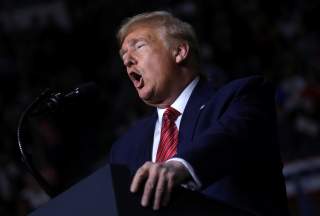Could Coronavirus Cost Donald Trump the 2020 Election?
For two years commentators and analysts have rattled off that President Donald Trump has a reliable chance at reelection “as long as the economy stays on track.” Will the spread of the coronavirus alter that?
It has been a rule of thumb in American politics that the single most important issue people vote on is the state of the economy. Why is the incumbent president popular or unpopular? “It’s the economy, stupid,” is the casual response. For two years commentators and analysts have rattled off that President Donald Trump has a reliable chance at reelection “as long as the economy stays on track.” Will the spread of the coronavirus alter that?
The U.S. economy is tracking on a ten-year expansion, continuous growth since the 2007-2008 financial crisis and the resultant Great Recession. This expansion has been enabled by a loose monetary policy at the Federal Reserve and artificially low-interest rates. As a candidate Donald Trump deplored this policy, correctly arguing that manipulating the rate of interest for such a long period would do real damage to long-term productivity. But as president he has encouraged the policy and demanded the Federal Reserve do more to lower rates, knowing that the image of prosperity he receives credit for is built by the board at the Fed. President Trump now sits on an unemployment rate of 3.5%, the lowest in fifty years.
The panic resulting from the coronavirus, however, may change that. The very contagious respiratory disease has spread to multiple countries around the world, with over 83,000 infected globally. The death rate is still debated, with major differences in countries such as China and countries in the west with modern healthcare facilities. But expectations of a disaster have shaken the stock market.
For a seventh consecutive day, the S&P 500 declined, with a total loss this week of 11%. This is the largest stock market drop since October 2008 during the financial crisis. It’s a direct reaction to the danger coronavirus poses to international travel, trade, and supply lines.
For his part, President Trump has attempted to calm the public, presenting his administration’s response as quick and decisive. This week he appointed Vice President Mike Pence to lead the Corona Task Force. Trump has also praised the Chinese government’s response to the epidemic, assuring people the worst has passed.
Writing in Barron’s, Lisa Beilfuss doesn’t believe the reaction to the coronavirus will have long term deleterious effects. “Goods-level demand is more delayed than lost,” and since even the possibility of quarantines won’t hinder Americans as much as they did the Chinese, we “may well escape the virus relatively unscathed.”
On the other hand, writes David Lynch in The Washington Post, the Federal Reserve is unequipped to respond to public health disasters. The central planners of the monetary system lack the tools to adequately turn dials in response to the collapse of supply chains and other random acts of god. Repairing the damage done might be out of anyone’s hands.
An economic crash, caused by an inability to responsibly deal with a major health crisis, could sink President Trump’s reelection in November.
Hunter DeRensis is senior reporter for the National Interest. Follow him on Twitter @HunterDeRensis.

